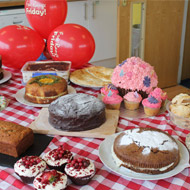
Hen charity urge people to eat cakes in return for a donation
A hen charity has launched an appeal to raise funds for a new rehoming and education centre.
The British Hen Welfare Trust (BHWT) has submitted a planning application to build the centre at its base in South Molton, Devon. They expect the build to cost around £200,000.
Once established, the centre will serve both as a place to re-home caged hens and as a space for holding educational talks and training.
The campaign is set to launch on the first ever British Hen Welfare Day (BHWD) on Friday, 23 September which, the charity hope, will become an annual event.
This year, the BHWT urge people to get involved by holding a Free Range Friday and invite their friends and family to eat cakes in exchange for a donation towards the centre.
Staff at the charity's headquarters will also get involved by baking cakes and bringing them into the office. We’re also told they will be doing something ‘a little eggstra special’ on the day - details of which will be revealed soon.
“This year has already seen the British Hen Welfare Trust achieve some truly wonderful things, from re-homing our 500,000th hen to carrying on making strides in improving the lives of commercial hens,” commented charity founder Jane Howorth.
“This year we are also looking to build our first flagship re-homing and education centre at Hen Central in North Devon. But to do that we need the help of our wonderful supporters, and we believe that together you can all help us towards our goal.
“So whether it’s inside or out, hot or cold and whether you’ve got 50 people attending or five, get the cakes in, get the kettle boiled and get eating!”
If your practice would like to take part in the event, please contact corinne.hendrie@bhwt.co.uk for an information pack.



 The Federation of Independent Veterinary Practices (FIVP) has announced a third season of its podcast, Practice Matters.
The Federation of Independent Veterinary Practices (FIVP) has announced a third season of its podcast, Practice Matters.